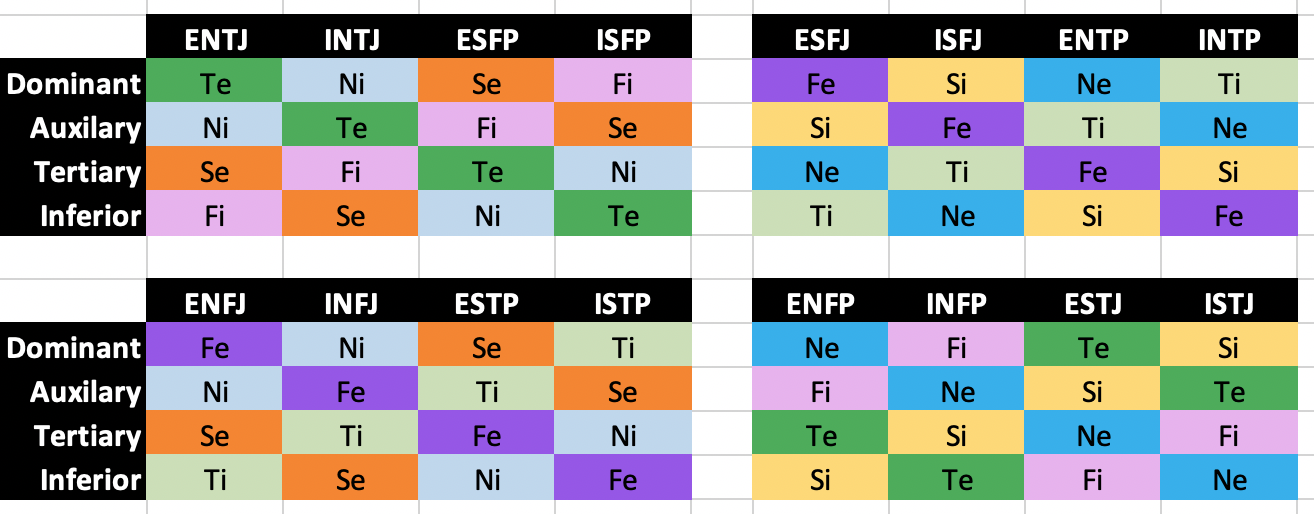A Shortcut to Your Unique Personality
Understanding your personality type can be incredibly liberating.
When asked by a colleague to teach on personalities at Mira Costa College, I felt resistance. I felt even more resistance to writing this blog.
Here’s why.
While I’ve spent thousands of hours studying, working, and teaching with personality-based systems, and while they’ve been immeasurable for my personal growth, I’ve often seen them used for more harm than good. And it makes sense.
I’d say after about 15 minutes, most people are in the, “data science looks super easy,” stage. Can you see how that could get a little dangerous?
Imagine if you learned the art of Karate in a suspect, 15-minute online course or Podcast, then began to demonstrate your Karate prowess to others? What if you became their sensei?
It not only wouldn’t make sense, it’d be a bit dangerous. Yet, that’s what has been happening. People learn 15 minutes worth of material, then become the expert. It’s the whole “Dunning-Kruger” effect. (So I want to add: be careful of which sites you use. Most that give generic descriptions of types aren’t accurate. At the bottom, I included a link for a site I trust.)
This is where I get conflicted. Because when used correctly, growing in your knowledge of your personality can almost ‘unlock’ your soul. It’s a unique way of seeing yourself beyond your own first-person perspective. And when you can see how you interact with the world in the way that you do, you now have immense potential energy for growth. This energy can flow into others, allowing them to see themselves beyond themselves as well.
However, when this tool is used incorrectly, it can feel like someone is testing out some Roundhouse kicks on you. With that, here’s are 2 things Personality Systems are not meant for:
“Justifying” oneself
“I’m an Enneagram-3, which is why I cannot stop working.”
“Constraining” others
“My wife is a Feeler; she’s not that logical.” “My husband is an introvert; he doesn’t like opening up to others.”
These perspectives are not just off-putting. They’re wrong. Some Type 3’s can be mindful of themselves outside of their productivity; some of the Feelers I know are the most logical people I know; some Introverts are some of the most openly expressive people I’ve ever encountered.
For me, the joy of personalities is to EXPAND a person. Not limit them. But when personality is used to confine, all that comes across is, “My type is better than yours.” So I hope you can see why a little knowledge, can in fact, be quite dangerous when used the wrong way.
The last thing I’d want to do is promote these judgmental notions. And perhaps this is the ‘Enneagram-9 Peacemaker’ in me—that was semi-sarcasm—but I’d also like to do my small part to promote a healthy narrative.
In this post, I’ll just review Myers-Briggs Personality System, which lately, has unduly gotten flack.
If there’s interest in unlocking the Enneagram, I can write a separate post on that.
—
If you’re like 99% of people who know their Myers-Briggs, you’ve 1) taken an online test, 2) scored your 4 letters, and 3) Googled your results. You clicked on the first link and thought, “Okay, parts of this make sense.” You spoke about it with your best friend and forgot about it until that drunken stranger asked for your type at a party. But you’re probably also using it incorrectly.
So for a moment, I want to take out my Men In Black, mind-erase device and clear your memory of all Myers-Briggs prior knowledge. I’m going to introduce some new personality terms. Don’t be alarmed. I’ll explain them all. They’re simple once you get the hang of them.
Here’s where I’ll start: the whole point of Myers Briggs is to find your, “Cognitive Function Stack.”
Each type, yes, those 4 combined letters (“E” extravert / “I” introvert; “S” sensor / “N” iNtuitive; “F” feeler / “T” thinker; “J” judgement / “P” perception), has a Stack of 4 Cognitive Functions. The order of your Stack is important. Your Stack order, in descending order of importance, represents your particular lens on the world.
Let me tell you why, and I cannot emphasize this misconception enough. When someone says, “I may be an ENFP…or maybe an ENFJ,” even though this is 1 letter off, the Cognitive Function Stack is 100% different. The personalities are 100% way different. As in (and this might sound crazy), an ENFP will have a more similar personality type with an ISTJ than they would with an ENFJ.
I’ll demonstrate why in a moment, but let me reiterate: Myers-Briggs is much less about your individual letters and MUCH MORE about how those letters come together to form your Cognitive Functions (CF). Let me give an example. I’ll use 4 “E,” or Extraverted personality types: ENTP, ENTJ, ENFJ, ESFP.
Now, most would say, “Oh cool, you’re extraverted,” and this could be the extent of understanding the personality. But really, each of these 4 types interact with the world in a completely different manner.
The ENTP uses the CF called, “Extraverted Intuition.”
The ENTJ uses the CF called, “Extraverted Thinking.”
The ENFJ uses the CF called, “Extraverted Feeling.”
The ESFP uses the CF called, “Extraverted Sensing.”
And this is just their Dominant function!
Let me sidetrack for a second. So you know when you learn anything new it’s going to seem awkward? Like the first 5 times I sat in a Yoga class I was reminiscent of a Kindergartener writing his ABC’s in cursive. It was messy. Same goes with learning personalities on your first few passes. That’s why I’m trying to give you a solid foundation. Otherwise, you’ll be trying to help others read and write before you’ve learned to spell your name.
Like anything new, working with your CFs may, at first, feel overwhelming. That’s normal. But once you get the hang of it, it’s not as hard as it seems. As you get the hang of it, you can use personality type to better understand and connect with others. And I’ll tell you what. You may even be surprised.
You know how there are just some people who you’re magnetically attracted to? And others whom you just ‘don’t get?’ I’d bet that is it’s just a difference in Cognitive Functions. That’s it. You’ll find patterns in your friend groups and people whom you date.
Anyway, I wrote out some basic attributes of the 8 Cognitive Functions. Your individual CF Stack will have 1 from each pairing. Note which CFs stick out the most to you. If you really resonate with 1 or 2, there’s a good chance it’ll be your Dominant or Auxiliary Function.
Are you more Ne or Ni?
1. Extraverted Intuition (Ne) “Exploration”: Constantly asks, “What if…” questions just to ask them; unconsciously expands worldview and can be labeled as “scatter-brained” because so many possibilities are being seen at once; insanely curious and great at starting new things; physically, eyes may toggle side-to-side when processing info.
2. Introverted Intuition (Ni) “Perspectives”: Unconsciously cannot turn off seeing other people’s perspectives, patterns, and themes; unlike Ne, will see possibilities but hone in on one result; bases all present decisions on potential, future implications, which can often be confused as not being ground into present reality; physically, eyes may drift upwards and to the right when processing info.
Are you more Se or Si?
3. Extraverted Sensing (Se) “Sensation”: Rarely thinks about the past or the future, but stays in the present; consciously uses their superpower of being incredibly attuned to their 5 senses (taste, touch, smell, sight, sound); values spontaneity, which can often be confused with impulsivity; even when telling a story of the past will say it like it just happened.
4. Introverted Sensing (Si) “Memory”: Uses what they’ve seen in the past to make sense of the present; stores personal experiences and concrete data points to form opinions; can be highly detail-oriented; thinks “traditionally,” and likes to preserve routines and values that have worked, which can often be confused with stubbornness.
Are you more Te or Ti?
5. Extraverted Thinking (Te) “Effectiveness”: Is more concerned with getting information out and things accomplished; does not like to sit on information, but wants to do something about it; creates order from chaos; usually loves charts and graphs; good at making executive decisions and figuring out how the pieces fall together later; gets things done; may be confused as not caring about other’s feelings or well-being.
6. Introverted Thinking (Ti) “Accuracy”: Information churns in the mind; would rather be correct than fast; harder to come to a set conclusion or decision; wants as much info as possible, including the fine-print; constantly scans for inconsistencies and incongruities like a computer scans for viruses; may be confused with being slow to act, not spontaneous, or risk-adverse.
Are you more Fe or Fi?
7. Extraverted Feeling (Fe) “Harmony”: cannot shut off feeling other people’s feelings; can take on the feelings of others; has the greatest ability to manipulate (positive or negatively) an environment; is more aware of social graces such as what is most considerate, polite, and appropriate; physically, smiles may open sideways like curtains opening to draw others in.
8. Introverted Feeling (Fi) “Authenticity”: cannot shut off being aware of their own feelings; is constantly aware if something is real or fake; most likely to perceive what is evil in the world; places high value on “being real” and being in alignment of one’s self; physically, smiles may go upwards and through the nose as one is in touch with their own experience.
Do any of these CFs resonate with you? You might have to play around with them for a while.
See if you can spot your CF Stack and Personality
These are grouped in 4s that rep sets of similar CFs in different orders
In case you’re wondering how this fits in with therapy, I align sessions with personalities. To me, there’s no one-size-fits-all for therapy. Personalities reveal unconscious ways we interact with the world and others. Each type will have certain blindspots that contribute to stuck states. I also find Personality-Based Systems to be a useful tool for working with couples (or families), who continue to get in the same interaction cycles.
If you’re interested in understanding more about your type, feel free to reach out. And if you want more info, my go-to source is Antonia and Joel from Personality Hacker. They’re great.



